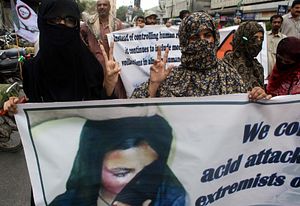In Balochistan’s traditionally patriarchal society, women regularly face discrimination, assault, and murder in the name of “honor.” They have little space in the political, cultural, economic, or social fields. Balochistan tops the rankings in Pakistan in terms of maternal mortality, female illiteracy, unemployment, and gender disparities. Conditions are even worse for Balochistan’s women in rural areas. Take female literacy, a shocking 2 percent in rural Balochistan, compared to 26 percent for the province as a whole.
Interestingly, in Balochistan’s more enlightened Makran division, which consists of the Panjgur, Kech and Gawadar districts, female literacy is comparatively high. The reason: Co-educational private schools are flourishing. These schools have produced an educated class of women, who today have established themselves as educators, politicians, and doctors. Among them is Zubaida Jalal, who was born into a poor Baloch family in the town of Mand, in Kech district. From 2002 to 2007, Jalal was the first federal education minister.
In recent years, though, the number of girls dropping out of education has surged, in the wake of attacks and threats to privately-run co-educations institutions in Makran division by religious fundamentalist groups. Parents in Quetta told The Diplomat that in the aftermath of attacks on privately-run schools they were now sending their daughters to government-run institutions. A national daily has reported that the dropout rate is an appalling 70 percent, adding that although co-education schools and colleges exist in Makran, threats from new militant organizations are keeping girls at home. That has given Balochistan the lowest female literacy in Pakistan.
‘Honor’ Killings
The practice of so-called honor killings drew global attention in 2008, when three teenage girls were buried alive in Balochistan’s Nasirabad district. According to media reports, the girls were taken to remote areas of Nasirabad by the brother of a tribal notable, where they were shot and then buried while still alive. The brother of the accused, a minister under the former provincial government of Nawab Aslam Raisani, denied that his brother was involved, and local journalists were threatened after breaking news of the crime.
The Aurat Foundation (AF), a non-governmental organization working for women’s rights, has reported hundreds of instances of violence against women in Balochistan. In its most recent report, the foundation said that at least 187 cases of violence against women occurred in Balochistan in 2014, compared with 151 cases in 2013. It also reported 75 honor killings, with particularly grim figures for Sibi and Nasirabad divisions.
It should be noted that a great deal of violence goes unreported. Balochistan is the largest province in Pakistan by area, and many villages are remote. There is little investigative reporting, and those journalists who have tried to report on the persecution of women have themselves faced threats.
But violence is not the only threat to women’s health. In rural Balochistan, maternal mortality rates are high. Due to poverty and a lack of awareness, many women are not brought into Quetta to give birth.
“One of my aunts in remote Nushki lost her life during pregnancy,” said a resident of Nushki, adding, “This happens often, because they cannot afford to bring women to the city. That is why they suffer silently and die.”
In rural Balochistan, poverty is extreme. This combined with illiteracy and growing radicalization have compounded the woes of women. The Pakistan Health Demographic Survey (PHDS) reports that Balochistan leads the nation in maternal mortality, with 785 deaths for every 100,000 women, compared to 272 in the rest of the country.
“Outside Quetta, it is common for women to die during pregnancy. Only a few pregnancies are registered in hospitals of Quetta,” said a Quetta-based doctor. The mortality rate is shocking even in Panjgur, the constituency of Minister for Health Rahamat Saleh Baloch.
Acid Attacks
Another tragic byproduct of rising extremism is the practice of acid attacks by extremists, with the first reported in 2010, when two sisters in Dalbandin, headquarters of the Chagai district, were targeted. A hitherto unknown group called the Baloch Ghairatmand Group claimed responsibility for the attack. Since then, a number of similar incidents have been reported in Balochistan, involving men on motorcycles throwing acid on women and then fleeing.
Last year, four polio workers, including three women, were target killed in the outskirts of Quetta. That prompted a boycott of the polio campaign, but despite the risks the workers have since returned.
Illiteracy, honor killings, maternal mortality, and acid attacks – clearly, conditions for women in Balochistan are shockingly poor, and they are getting worse. But despite claims of action, there is little evidence that the chief minister Dr. Abdul Malik Baloch or his all-male cabinet have done anything of significance to address the situation. For now, it appears that Balochistan’s women will continue to suffer.
The author is a columnist at the Daily Times. Visit his blog or follow him on Twitter @Akbar_notezai. He can be reached at [email protected].

































